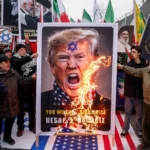
Trump’s counselor says Washington would withdraw Buenos Aires loan request to the IMF if he reinforced China’s “position” in Argentina
One of US President Donald Trump’s leading advisers said Washington’s support for Argentina’s in progress negotiations with the International Monetary Fund depends on the distance from China President Javier Milei, specifically ending a sowing swap agreement with Beijing.
Speaking of Miami Dade College on Thursday, Mauricio Claver Carone, a special envoy from Trump to Latin America, described Milei as “an ally,” but emphasized that Washington’s priority is to ensure that any new agreement with the IMF does not “reinforce China’s position” in Argentina.
“We want the famous credit line that Argentina has with China Ahab,” said Claver Carone, referring to the Swap agreement, which he labeled “extortive.” He warned that as long as he remains in force, “China can always extort Argentina.”
Currency swap agreements allow two countries to exchange currencies at a pre-covered rate, providing liquidity to each other at times of need.
For Argentina, the swap line with China has been critical as it allows the country’s central bank to access Renminbi that can be converted into dollars, reinforcing foreign reserves and, by extension, the Argentine government’s ability to pay creditors, including the IMF.
With the history of financial instability of Argentina and limited access to international markets, the Swap agreement with Beijing has acted as an essential financial support. Originally signed in 2009, it was renewed and expanded several times.
The current agreement, renewed in June 2024 after months of uncertainty, is worth about $ 5 billion and runs until July 2026. Without him, Buenos Aires would face even greater pressure on his reserves at a time when economic conditions remain precarious.
The South American country has been dealing for years with persistent tax deficits and strong dependence on foreign debt, creating a cycle of inflation and coin devaluation. Inconsistent economic policies and political instability further undermine investors’ confidence, preventing sustainable growth.
Claver Carone’s comments take place at a critical moment for the Milei government, which is negotiating a $ 20 billion loan from the IMF under a new 10 -year program.
Already being the largest debtor of the IMF, Argentina urgently seeks new funds to stabilize its financial system, recapitalize its Central Bank and eventually suspend its old currency controls.
Earlier this week, IMF director Kristalina Georgieva, signaled support for Milei’s request, describing Argentina’s petition for an initial disbursement as “reasonable” and saying that the government “deserved it” due to its economic performance.
However, US support is crucial as Washington is the largest shareholder of the IMF and has a decisive influence on major decisions.
The Milei government sent Economy Minister Luis Caputo and presidential secretary Karina Milei, the president’s sister, Washington this week to raise support.
However, his meetings with Secretary of State Marco Rubio did not yield any concrete commitment, despite Milei’s strong personal alignment with Trump. Efforts to set up a meeting with Claver Carone-considered a key figure inside Trump’s inner circle-were unsuccessful either.
To complicate the situation, Argentina was not spared the 10% global import tariff announced by the White House on Wednesday.
Milei team officials are now in negotiations with US Secretary of Commerce, Howard Lutnick, and commercial representative Jamieson Greer to seek tariff exemptions and negotiate a long -term trade agreement.
But the chances of a comprehensive free trade agreement with Washington are remote, as Argentina’s affiliation to Mercosur prohibits the country from negotiating with the US outside the South American commercial bloc, which also includes Brazil and Paraguay.
Trump administration demand for Chinese exchange puts Milei in a difficult situation. After campaigning on an anti-china platform-describing Beijing as a “killer” state-Malei softened his position in office.

Facing growing economic pressures, he struggled to improve relations with China, which culminated in a visit to Beijing at then -Giend Foreign Minister, during which she assured Chinese foreign minister Wang Yi, that Argentina’s “friendly policy” about China would remain unchanged.
Milei himself publicly praised China as “a very interesting commercial partner” and thanked Beijing for renewing the crucial exchange swap agreement.
Patricio Giusto-director of the Sino-Argentine Observatory in Buenos Aires and a stained tie defender between the two countries-said Claver Carone’s demand was unrealistic, given the financial restrictions and geopolitical needs of Argentina.
He argued that he made no sense for Argentina seriously to consider giving up on swap agreements, since neither the IMF nor Washington would be willing to replace liquidity. In addition, he warned, discarding the agreement would have negative consequences for Argentina’s relationship with China.
“If there is any kind of offer, some kind of financial program, a specific financial program for Argentina, this can happen,” said Giusto.
“But so far, I don’t think it’s viable. I think it was just a political statement by taking advantage of Argentina’s delicate situation.”
Giusto said the United States may be using negotiations between Buenos Aires and the International Monetary Fund to try to distance Argentine President Javier Milei from China.
Milei is due to travel to China in May to attend the China-Celac Forum, a meeting of most Latin American and Caribbean nations.
Argentine authorities said in private conversations that the trip continues within the schedule, but Milei may change their plans due to the participation of leaders such as Venezuelan President Nicolás Maduro and Nicaraguan President Daniel Ortega, with whom he has cold relations.
With information from SCMP*
Source: https://www.ocafezinho.com/2025/04/05/trump-ameaca-milei-emprestimo-do-fmi-so-sai-com-submissao-total/

